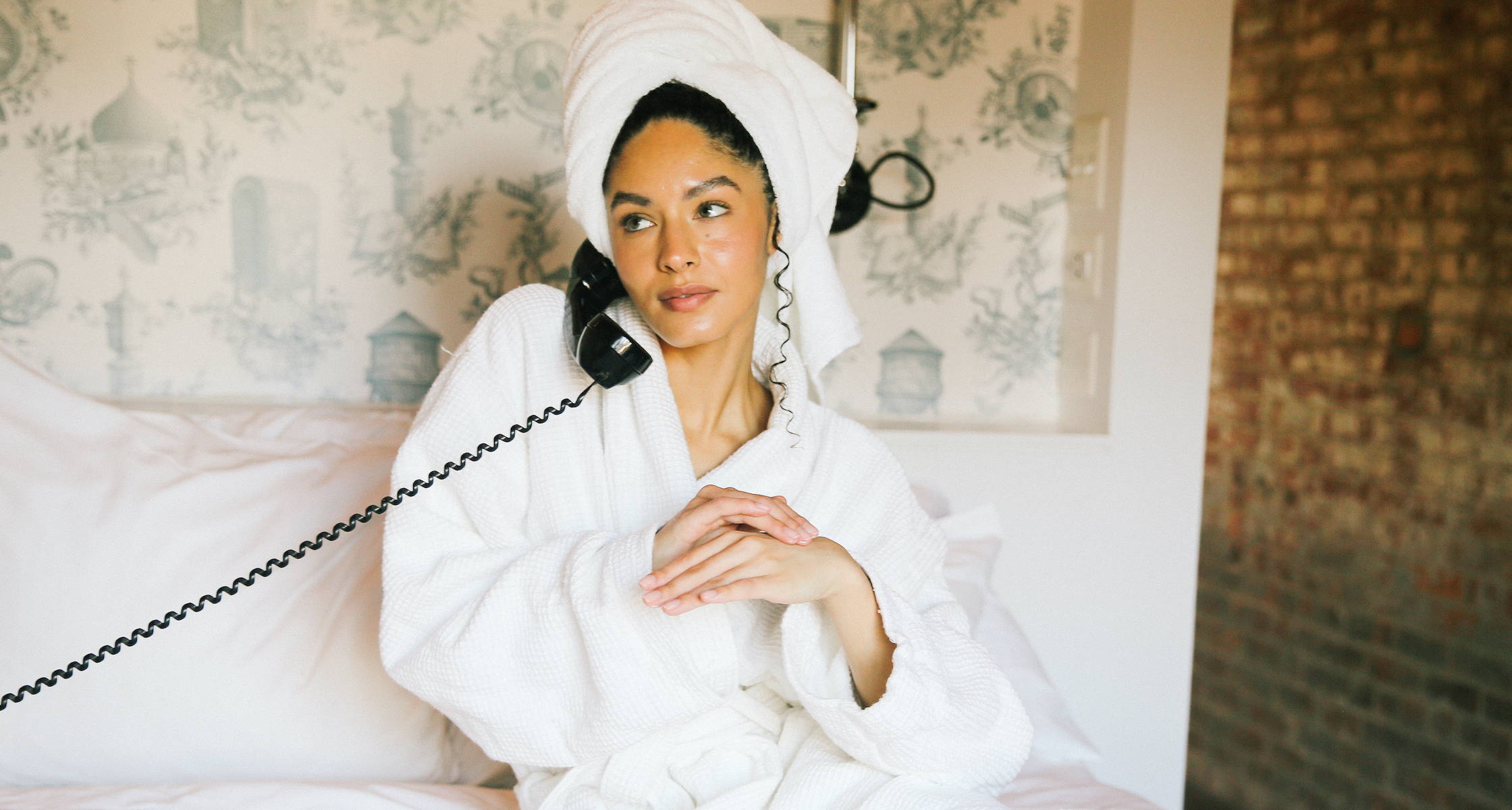Free Carbon Neutral Shipping On Orders $75+, Plus Free Samples!
Buy Now and Pay Later in 4-interest free installments with Klarna
Your hair needs both protein and moisture to be healthy. Each strand of hair is held together by disulfide bonds. Proteins strengthen these bonds, making hair stronger and less prone to breakage. Moisture is what keeps the strand smooth and hydrated. But finding the right protein moisture balance isn’t always straight-forward. And hair that is devoid of either loses its elasticity, making it more susceptible to split ends and breakage. You need just the right level of hydration and nutrients to avoid dry hair, frizz and general unruliness. If your curls are looking limp and lifeless or your hair texture feels brittle and dry, you’re likely dealing with a protein moisture imbalance. Wondering how to tell if your hair needs protein or moisture? We’re breaking down everything you need to know about protein vs. moisture ahead- plus the best tips and products to help you balance it all.
Lots of things can compromise the protein in your hair, including everyday wear and tear. But especially if you color your hair or use chemical treatments, it's common to experience a protein deficiency. Proteins are the building blocks of your hair. When your body lacks them, it prioritizes essential bodily functions over healthy hair growth, leading to weakened hair follicles and hair that breaks easily. Wondering how to know if your hair needs protein? Let’s take a look at the top signs your hair is lacking protein.
Highly porous strands have tears and gaps in them, exposing the cortex to stressors. This causes the hair to absorb and release moisture faster than normal, leading to frizzy, tangled hair.
Hair that’s lacking protein will appear less bouncy and full as it normally is. It will be flat, stringy and dull.
Try the wet strand test to check your hair’s elasticity. Wet a strand of hair. Hold it tight then gently pull it. If the hair stretches and bounces back without breaking, it’s healthy. If it stretches and doesn’t return or stretches and breaks, you’ve got low elasticity.
Hair color, bleach, and treatments that contain chemicals, alter the bonds of the hair, making the hair more susceptible to protein loss and breakage.
It’s normal to lose up to 100 hair strands a day. If you’re losing more, it could be a protein issue and needs to be addressed immediately.
Gently stretch a strand of your hair when it's dry. Healthy hair should have some elasticity to it and bounce back when released. Hair with split ends may snap or break easily without stretching.
If your hair feels mushy and sticky, it’s a sign the protein bonds in your hair have been weakened beyond repair causing it to feel like bubblegum.
Once you know your hair is lacking protein, it’s a pretty easy problem to solve. One of the simplest ways to combat a lack of protein is to include more protein-rich foods into your diet. Incorporate sources like lean meats, eggs, dairy products, legumes, and nuts to ensure you're getting an adequate supply of protein. You should also add hair care products formulated with proteins like keratin or collagen to your hair care routine. These treatments can help strengthen your hair and improve its texture over time. But it’s important to note that too much protein can make your strands feel stiff and more prone to breakage. If you notice your hair beginning to harden, swap out your protein shampoo and conditioner for a moisture-based range.

The Cru Salon in Reno, NV. @thecrusalon
A moisture deficiency feels a lot like protein deficiency. When your hair lacks moisture, it can feel rough and coarse to the touch, and it may appear dull and lifeless. The cuticles on the hair shaft become rough and raised, causing dry, frizzy hair that’s easily tangled, with weak curls and coils. Moisture loss can be attributed to the use of chemical treatments like bleaching, relaxers, hair coloring, or over-using heat-styling tools which cause damage. Here are a few vital signs your hair is lacking moisture are:
Hair that needs moisture will split easily at the ends. But “split ends” don’t just stay there. The drier your strands, the faster they’ll split up the hair shaft until they’re addressed.
If your hair lacks shine since coloring or chemically treating it, and you’re experiencing dull, brittle strands, your hair is in need of moisture. Hair that is dry or damaged won’t have a shiny, healthy look.
When your hair is depleted of moisture, the cuticles on the hair shaft become rough and raised, causing frizz. If your hair is excessively frizzy, or your curl pattern is difficult to see through the frizz, your strands are moisture deficient.
Curly hair is already prone to knots and tangles, but excessive tangling is a sign of hair in need of moisture. Excessive tangling means seeing tangles during the course of a normal day, or tangles that get extremely knotted.
The health of your hair ultimately starts with the health of your scalp. A dry scalp shows itself through dandruff or flakes, and in some cases even as oily hair. This is a major indicator that your hair is lacking moisture.
Hydrating your hair is just as important as moisturizing your skin. So once you’ve determined that your hair is dehydrated, it’s time to get to work. Address the moisture deficiency by taking a look at your hair care routine. Make sure it includes hydrating shampoos and conditioners, as well as regular deep conditioning treatments like hair masks, hair oils and hair butter. Stay far away from sulfates and look for products with ingredients like aloe vera, glycerin, or hyaluronic acid, which help to lock in moisture and prevent it from escaping throughout the day. Avoid using hot water when washing your hair, as it can strip it of its natural oils. Opt for lukewarm water instead, and finish your shower with a cool rinse to seal the cuticles and lock in moisture. Avoid heat-styling and air-dry your hair when you can.

By now you know that your hair needs both moisture and protein to be its healthiest. But are you lacking in either? The first clue lies in understanding your hair's unique characteristics. The finer your hair is, the more protein is needed to prevent breakage and add structure. Also, the more porous your hair is, the more protein it will need to fill in the gaps in the cuticle. So those with fine, high-porosity hair will need the most protein, and those with coarse low-porosity hair will need the least. If you’ve recently highlighted or chemically treated your hair, you also need to use protein regularly. Protein treatments can help strengthen the hair shaft and restore its structural integrity. On the other hand, if your hair feels dry, frizzy, and lacks elasticity, it's likely in need of moisture. Hydration is essential to keep your strands soft, manageable, and resilient. By paying close attention to these factors and customizing your hair care routine accordingly, you can strike the perfect protein moisture balance for your happiest, healthiest head of hair yet.
Your hair needs both protein and moisture to be healthy. Protein strengthens your hair’s bonds, making it stronger and less prone to breakage. Moisture is what keeps it smooth and hydrated. Knowing when your strands are lacking in either is the difference between good hair health and hair damage. But finding the right protein moisture balance isn’t always straight-forward. You need the right combination of hydration and nutrients to avoid dry hair, frizz and unmanageability. If your curls are looking limp and lifeless or your hair texture feels hard or brittle, you’re likely dealing with a protein moisture imbalance. Keep our expert tips in your rotation and use only the highest quality hair care products to help you balance it all, like the ones from Davines. Our hair care isn’t just good for your hair, it’s good for the planet.
For more on how to tell if your hair needs protein or moisture, or for an in-salon treatment to replenish lost proteins or moisture in the hair, book an appointment at a Davines salon near you.
by Jaclyn LaBadia, featured contributor
Laisser un commentaire
Les commentaires sont approuvés avant leur publication.